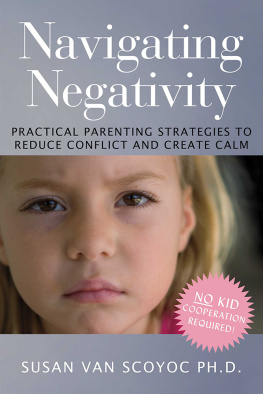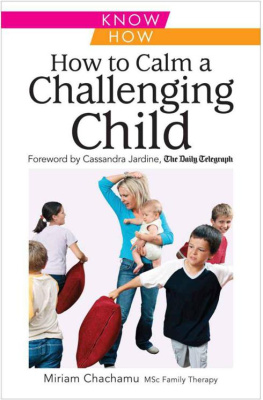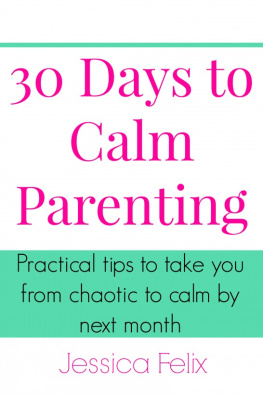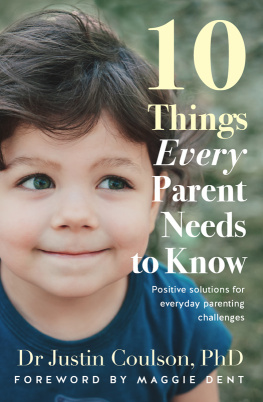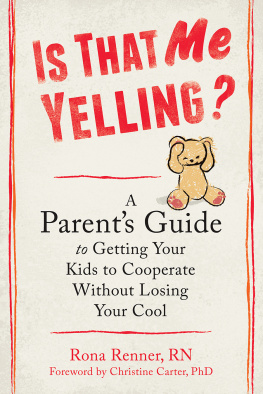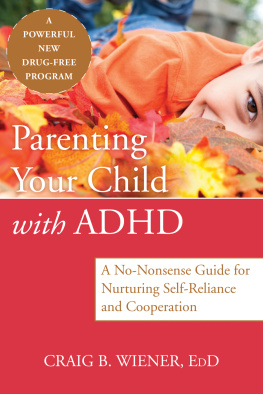Navigating Negativity: Practical Parenting Strategies to Reduce Conflict and Create Calm
Copyright 2018 by Susan M. Van Scoyoc
All rights reserved. No part of this book may be reproduced or transmitted in any form or by any means, electronic or mechanical, including photocopying and recording, or by any information storage and retrieval system, without permission in writing from Susan M. Van Scoyoc.
Print ISBN 978-1-54394-329-0
eBook ISBN 978-1-54394-330-6
Printed in the United States
First Printing, 2018
Editor: Kindree Mieling
For more information, please contact Dr. Van Scoyoc at
All identifying details have been changed to protect confidentiality. This book is designed to provide accurate and authoritative information in regard to the subject matter covered, and every effort has been made to ensure that it is correct and complete. The author, however, is not engaged in rendering professional advice or services to the individual reader. This book is not intended as a substitute for professional advice from a trained therapist or similar professional. If you have concerns about your child, please seek the services of a health care professional.
For Chad who supports my dreams
For Lilah and Jack who inspire me to be my best every day
For all negative kids who need to be understood
Introduction:
Why Your Negative Child Needs Your Help
My drawing is so bad. I cant make it look right ever!
Katherine, age
We never go the places I want to go!
Adam, age
I hate soccer; no one ever passes me the ball!
Chris, age
My friends dont want me around. They never laugh at my jokes. Im just not funny.
Sarah, age
It doesnt matter how much I study; I never do well on my math tests. Ill never get into college!
Jessie, age
Why cant we go to Joes Pizza, this new place is probably going to be gross!
Diego, age
The Problem with Negativity
You chose this book because you are worried about your childs negativity...worried and frustrated and scared and angry and guilty and most other scary parent emotions that come to mind. You want to confidently navigate the road to happiness for your child but find yourself without the words or the patience to clear the trail.
Your negative kid seems to:
View life in all-or-nothing terms |
Apply rigid rules for self and others about what is right |
Turn a minor problem into an instant catastrophe |
Focus too much on fairness |
Be defiant when something doesnt go as planned |
Cherry-pick out the bad and disregard the good |
Resist trying new things |
Give up when something is hard |
Despite your best efforts to be positive, to explain why things arent so bad, or to punish that bad attitude out of your child, you do not see much progress towards positivity. Your child is NOT growing out of negativity. In fact, grumbling seems to have become an instant response for just about everything! With all of that practice focusing on what is wrong, even when your child is trying to look on the bright side, negativity has become the brains default reply. It is as if the good parts of life just do not register. You and your child are exhausted from such a grumpy, bumpy ride!
The problem with negativity (and why you need to help) is that it impacts every aspect of a childs life. You may notice struggles related to:
Self-confidence |
Coping skills |
Family relationships |
Maintaining friendships |
Participation in new activities |
Comfort level in unfamiliar situations |
Depression |
Anxiety |
When you think of how your negative child operates in this world, the risk for these problems probably does not surprise you. The downward spiral created by negativity and the resulting lack of confidence and social support can set the stage for mental health problems. In fact, negative thinking is known to be related to depression. Negative thinkers view obstacles as unchangeable and inescapable, and often their fault quite a roadmap for feeling helpless and out of ideas for success. Just think about how many times your child seems stuck when solving an everyday problem like making a choice, or perhaps uses the words always or never to communicate how permanent even small troubles feel!
Negativity might also be anxiety in disguise, as rigidity and complaining often mask the fear of failure or trying something new. If your child puts up a big enough fuss about tasting a new food or visiting an unfamiliar place, you might just give up to avoid the conflict. Anxiety wins and reinforces the idea that complaining works. As chronically negative kids get older, they can also lose social support from friends and family because their difficult-to-please attitudes, as you know, can be overwhelming to others. So what is the result of fewer new experiences due to anxiety or social rejection? Kids with negativity can often get written out of the social stories their friends are creating as they move on without your child.
For all of these reasons self-esteem, coping skills, family relationships, friendships, new adventures, and mental health the time to help your child with negativity is now.
What Can You Do To Help?
If you want to guide your negative-by-nature child, there are a few things you need to know and do:
- Go First : Your child needs YOU to set the course for positive change, and you are already taking charge by reading this book!
- Know the Enemy : Negative thinkers are just responding to flawed brain data--they are not being negative on purpose. In this book, you will learn to identify just what might be behind that rigid response and discover critical facts about how negative brains work.
- Be a Credible Teacher : You have to know how to reach and teach your child if you want to be viewed as a credible ally in the fight against negativity. Your child has to trust that you are someone who, when the obstacles and annoyances do happen, sees negativity for what it is and can help navigate to less distressing exits. Chapter 3 gives you tips to boost your teaching success rate that apply to all aspects of parenting, not just conquering negativity.
- Know What To Do During Conflict and Every Other Minute of the Day : The two strategy chapters in this book focus not only on what to do when your child is in full meltdown mode but, even more effectively, what to do every other minute of the day! When your child is upset, what you say and do does matter. Frustrated nonverbal messages and critical words just add fuel to a kids brain that is already on fire with distress and dissatisfaction. You will discover what to say and do instead, including helpful self-talk to best manage your negative emotions too.
Although knowing how to manage a meltdown is important, the most powerful way to elevate your parenting confidence and secretly tame negativity at the same time is to figure out how to encourage positivity every other minute of the day. What you do with your child when negativity is NOT driving the car is the most important work you will do. Chapter 4 defines strategies you can use right now (and are probably good at already) to help your child tune in a bit more to the positive and leave those tantrums in the rearview mirror. Remember, what you do and say when your child is in a relaxed, teachable state matter the most!

